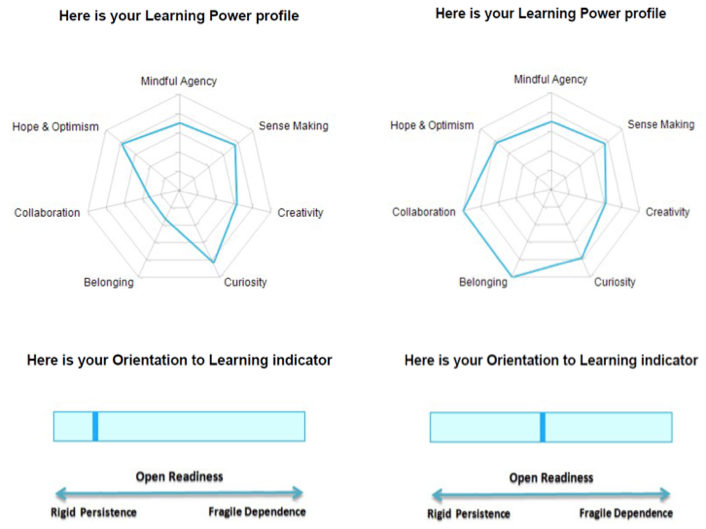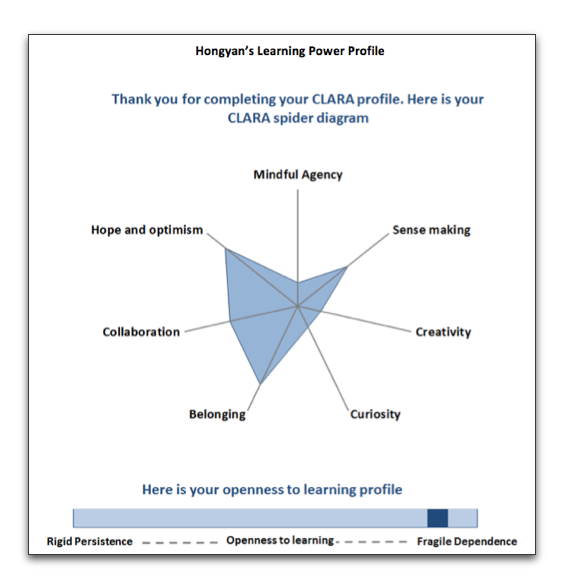Now that the “the only constant is change” in society, our capacity to engage with novel challenges is of first order importance. What are the personal dispositions for lifelong learning? Can we make such dispositions visible, and improvable for both learners and staff?
This page introduces the “Learning Power” applied R&D program in CIC. This underpins the provision of the Learning Journeys platform at UTS — please visit the orientation website for students and staff for an introduction, and LX.Lab briefings for training opportunities.
Learning Dispositions are attracting significant attention within educational research, and refer to the habits of mind that shape a learner’s response to challenge. Dispositional Learning Analytics are approaches to assessing these qualities, and providing feedback to learners and educators.
The Crick Learning for Resilient Agency Profile (CLARA) tool is a research validated survey instrument, designed by Ruth Crick (formerly University of Bristol and UTS, and now UTS Visiting Professor of Learning Analytics & Educational Leadership at CIC and the Institute for Sustainable Futures). CLARA is deployed internationally in diverse contexts (primary, secondary and tertiary education, and in workplace learning).
CLARA provides immediate feedback to the survey respondent, to provoke reflection on a multidimensional construct called “Learning Power” with eight dimensions: curiosity, creativity, sense making, belonging, collaboration, hope and optimism, mindful agency and openness to change. The UTS Graduate Attributes have a strong resonance with these dimensions.
Two examples of the personal ‘radar chart’ that is generated from CLARA are shown here, which become a springboard for supported reflection and coaching:

Aggregate views provide statistical summaries of a cohort’s profiles. The research behind CLARA and its predecessors demonstrates that naming these essential personal dispositions, and presenting them visually in a way that invites ‘stretching’ oneself on one or more dimensions, can have great impact. As such it resonates closely with Learning.Futures, offering a way to assess hard to quantify student qualities.
At UTS we have coached senior student mentors to introduce first year students to fictional profiles, based on archetypes of UTS students. An example of an archetypal student and her profile is shown below. These have proven to be an effective vehicle for helping students understand how learning power connects with their own life stories and habits of mind.
 “Hongyan moved to Australia last year. Her parents want her to go to University and be a medical student so that she can get a respected job and earn a good wage. She is an only child but she is very sociable and has many friends. Her parents have worked really hard to get her here so she feels under pressure make sure she does well at Uni.
“Hongyan moved to Australia last year. Her parents want her to go to University and be a medical student so that she can get a respected job and earn a good wage. She is an only child but she is very sociable and has many friends. Her parents have worked really hard to get her here so she feels under pressure make sure she does well at Uni.
She’s a very hard worker – she always got good grades at High School. She diligently listens to what the teacher says and does exactly what she thinks is expected of her but her grades haven’t been as good as she hoped. When she is faced with an open-ended question or a problem that doesn’t have a single right answer she panics and doesn’t know how to proceed. If there are rules to follow she is comfortable in her learning but when faced with complexity and uncertainty she gets confused and feels ‘groundless’.”
In class she nearly always sits with her other native-language friends and feels a strong sense of belonging to her cultural community. She likes learning with her friends and they will test each other in remembering names and formulae. She has a strong drive to please others and do well.
Deployment in UTS
CLARA has been piloted at UTS in partnership with academics in a number of contexts:
- All first year Science Students used it as part of a core subject
- Masters student in Business capstone projects
- First year engineering students
- Support for struggling students in the Business School retaking subjects
An internal analysis of approximately 3000 student profiles identified promising outcomes, as well as strategic options for scaling up the use of the tool. A briefing workshop reflected on the quantitative and qualitative evidence detailed in an internal report, summarised in Barratt-See et al (2017).
CLARA is now embedded in a product licensed by UTS called WILD, which supports the learner (student or staff) in undertaking a self-directed Learning Journey. Learn more about Learning Power at the UTS Learning Journeys information portal.
Underpinning research
The following papers are representative of a much larger body of work into Learning Power led by Ruth Crick. See their bibliographies to go deeper.
Crick, R., and Bentley, J. (2020). Becoming a Resilient Organisation: Integrating People and Practice in Infrastructure Services. International Journal of Sustainable Engineering, pp.1-18. Published Online: 1 June, 2020. DOI: https://doi.org/10.1080/19397038.2020.1750738. [Staff development case study connecting Learning Power to organisational staff survey results using VOICE]
Gardner, A., Goldfinch, T. and Willey, K. (2017). Characterising the learning dispositions of first year engineering students. Proceedings AAEE2017: Australian Assoc. for Engineering Education, Sydney. [PDF] [Learning Resources] [Quant/qual analysis of student dispositions, and a learning design for engaging students with Learning Power]
Barratt-See, G., Cheng, M., Deakin Crick, R. & Buckingham Shum, S. (2017). Assessing Resilient Agency with CLARA: Empirical Findings from Piloting a Visual Analytics Tool at UTS. Proceedings UniSTARS 2017: University Students, Transitions, Achievement, Retention & Success. (Adelaide, 1-4 July, 2017). [PDF] [Summary of a large internal UTS analysis]
Deakin Crick, R., S. Huang, A. Ahmed-Shafi and C. Goldspink (2015). Developing Resilient Agency in Learning: The Internal Structure of Learning Power. British Journal of Educational Studies 63(2): 121- 160. DOI and Open Access Eprint: http://dx.doi.org/10.1080/00071005.2015.1006574 [Psychometric basis for the construct of Resilient Agency underpinning the self-assessment survey]
Deakin Crick, R. & Goldspink, C. (2014): Learner Dispositions, Self-Theories and Student Engagement. British Journal of Educational Studies, 62(1), pp.19-35. DOI: http://dx.doi.org/10.1080/00071005.2014.904038. Open Access Eprint: PDF [Investigates different conceptions of learning dispositions]
Buckingham Shum, S. and Deakin Crick, R. (2012). Learning Dispositions and Transferable Competencies: Pedagogy, Modelling and Learning Analytics. Proc. 2nd Int. Conf. Learning Analytics & Knowledge. (29 Apr-2 May, 2012, Vancouver, BC). ACM Press: New York. DOI: 10.1145/2330601.2330629. Open Access Eprint: http://oro.open.ac.uk/32823 (conference replay) [Established Dispositional Learning Analytics as a field]